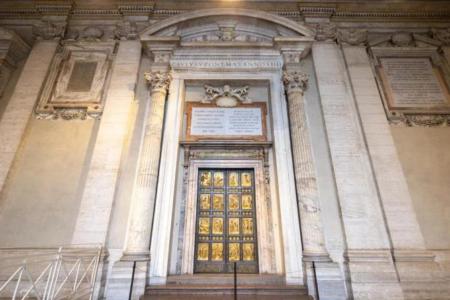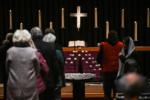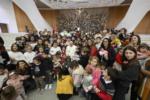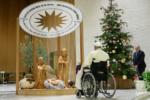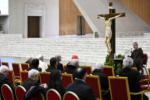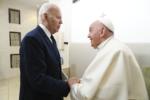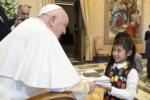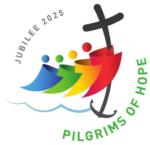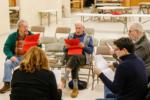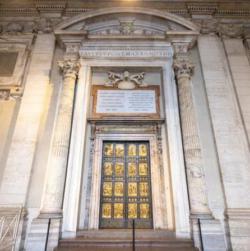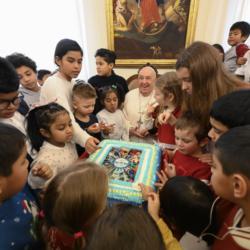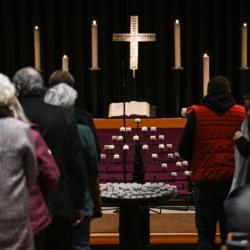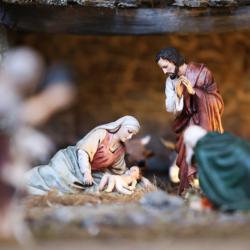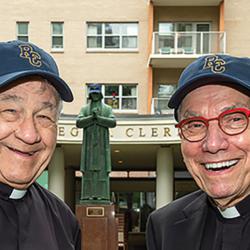From Brazil to Boston College and for the archdiocese
BRAINTREE -- Bishop Cristiano Barbosa can still remember the first time he saw snow falling.
It was shortly after he came to Massachusetts from his native Brazil in 2008 to earn his doctorate in sacred theology from Boston College. To attend school there, he needed to pass an English language proficiency test that was administered in New Hampshire. A friend drove him there, and, on the way back, Jack pulled over by a lake that he wanted Bishop Barbosa to see. After a lifetime spent in a tropical climate, his first New England winter was a bit of a shock.
"I remember crystals falling. Only crystals," Bishop Barbosa recalled. "And he said 'Oh, this is snow.'"
Bishop Barbosa was delighted to see "the beautiful white snow" drifting from the sky. He had plenty of time to get used to the feeling. After almost 16 years of ministry in the Archdiocese of Boston, he has seen "many, many snowstorms" -- including on Jan. 16, the day he sat down with The Pilot to talk about his life, formation, and upcoming ordination as an auxiliary bishop.
"I told God not to do this with the weather," he joked as he stepped into his office.
"God is getting this all out of his system so it doesn't snow on Feb. 3," replied Sister Pat Boyle of the Sisters of St. Joseph, associate director of the Archdiocese of Boston Office of Pastoral Planning.
Bishop Barbosa was to be ordained at the Cathedral of the Holy Cross in Boston on Feb. 3. At 47, he will be one of the youngest bishops in the U.S. He told The Pilot that he is both "happy" and "terrified" by the new responsibility, but he's so busy that he doesn't have much time to think about it.
"The ordination is weeks away," he said, "and everything's so behind."
Cardinal Seán P. O'Malley appointed Bishop Barbosa to be regional bishop of the Central Region, comprising Boston, Brookline, Cambridge, Somerville, and Winthrop. He previously served as the episcopal vicar of the region. Bishop Barbosa will be one of only two American bishops of Brazilian descent. Brazilians are the fastest-growing ethnic group in Massachusetts. There are currently 100,000 in the state, and their population has increased by 30 percent in the last 10 years.
"I never thought about becoming a bishop," Bishop Barbosa said. "But now there's this weight, this gravitas, this responsibility of clearly understanding. Understanding is difficult, but speaking at least with (the Brazilian community), and being able to communicate and understand that culture."
Bishop Barbosa called his fellow Brazilian-American bishop, Bishop Edgar Moreira da Cunha, SDV of the Diocese of Fall River, "a sign of joy, hope, and pride" for Brazilian-American Catholics, making them feel like part of the church. He said that Brazilians are "growing roots" and will soon become part of the fabric of Massachusetts, like the Irish and Italians who came before them.
"They are hardworking people, very honest," he said.
Like all Catholic immigrants, he said, Brazilians bring their unique faith customs with them when they come to the U.S. He said that many Brazilians are undocumented, making it even more difficult for them to adapt to life in the U.S. Many have left the Catholic Church to join evangelical churches, which Bishop Barbosa described as "very welcoming." As bishop, he hopes that he can provide the same welcome to the growing Brazilian population, particularly in Framingham, the Boston suburbs, and the Merrimack Valley.
While ministering at parishes with Brazilian communities in Lowell, he noticed fewer and fewer families in church, and fewer children in religious education classes.
"Kids disappear," he said. "How do we communicate with youth ministry in a way that is efficient, and tell them that it is meaningful and bringing them life to remain in the church, to need Jesus, to grow in a personal relationship with him, to learn how to pray, to be a loving community? Because Catholicism makes sense if we are a community; we receive the body of Christ to become the body of Christ in the world."
Along with his responsibilities in the Central Region, Bishop Barbosa serves as the archdiocesan Secretary for Evangelization and Discipleship. He described his work as containing "four dimensions:" the financial planning and stability of parishes; religious education, youth ministry, and family formation; sacraments such as Confirmation; and the archdiocese's diverse ethnic and cultural communities.
That emphasis on family and culture has been with Bishop Barbosa for his entire life. He was born in 1976 in Adamantina, a town of 35,000 people in southern Brazil. His mother was a teacher, and his father was a printer. He described his childhood as a happy one, growing up with his brother and extended family.
"Everything was more calm and peaceful," he remembered. "I grew up coming back from school and playing on the streets until sunset, or even beyond sunset, with my cousins."
His grandparents owned a coffee farm and had a small chapel on their property, next to the piles of coffee beans drying in the sun. However, Bishop Barbosa said he spent his younger days "playing, not praying." He was an altar server and attended Mass with his family every Saturday in a church that sat almost 1,000 people. At first, he would fall asleep in the pews, but as time went on, he started to pay more attention, especially after conversations with his uncle, who was a priest.
"I remember he was one of the uncles that I really liked the most," he said, "who knew about the world, who taught me things over the summer. The life of faith was always really serious."
When Bishop Barbosa was about 13 years old, he began attending Bible study. He wanted to go on a retreat with his brother, but he could not because he was too young. Instead, he became an active member of his church youth group. Church became a "second home." He spent more time at church than he did at his house, and he would often have lunch with his parents one time a week or fewer. He and his friends started a band that performed music during Mass -- Bishop Barbosa played the keyboard. They even recorded an album.
"I found joy, friendship, happiness, sport, games," he said, "but also a place to ask questions, to sing, to meet people, to relate to people, and to learn about the church in a vivid way."
He first felt called to the priesthood when he was about 14, at a charismatic Catholic event with 2,000 people.
"It was fundraising for the youth group," he remembered, "selling t-shirts with the name of Jesus."
He was meditating after receiving Holy Communion, and one of his friends performed a song about God calling Isaiah to be a prophet: "Whom shall I send? Who will be our messenger?"
I had the desire to say, 'I want to go,'" Bishop Barbosa said "I had just received Eucharist. So I said 'I want to go.'"
It was also around that time that he encountered the verse that would become his motto as a bishop: "That they all may be one," a quote from Jesus's Farewell Discourse in the Gospel of John.
He began to ponder that verse when he was 14 years old and reading an article about it in a charismatic Catholic magazine. He was touched by how, "of all things Jesus could have asked for us," his final words to his disciples before his crucifixion were a prayer to his father for unity.
"I understood at that age that that was Jesus's last wish, his desire," he said, "and it became somehow mine."
When he was in college, the train ride from Bauru to Adamantina was eight hours, giving him a lot of time to pray.
"I had this overwhelming desire to pray for unity in the church and among the churches," he said.
He continued going to youth group meetings and decided that after he graduated from college, he would become a priest or a missionary. Unlike in the U.S., where college students major in a subject for four years while taking other classes, college students in Brazil study their chosen subject exclusively for five or six years. Bishop Barbosa chose to study psychology.
"I love the human person," he said. "I have always loved the human being."
He attended school in Bauru, a Brazilian college town that he compared to Cambridge. He would study psychology every day from 8 a.m. to 6 p.m. but continued to study the Bible and participate in university prayer groups.
"I was really active in the church thinking 'Okay, God does not want me to do anything else,'" he said.
He believed that he would dedicate his life to academics until he went to Spain to study abroad in 1999. He saved up enough money to travel to Rome, going to confession and attending Mass at St. Peter's Basilica.
"Being in the heart of the church, I felt again the call," he said. "And for the first time after I was 14. God wanted me still."
In the basilica, he made a deal with God -- after he graduated, he would dedicate his life to Him. It was the first Saturday in February 1999. Twenty-five years later, on the first Saturday in February, he was to be ordained a bishop.
"That's crazy," he said.
While still studying psychology, he spent a period of discernment with the Shalom Catholic Community. In Bauru, he founded prayer groups at three universities and coordinated evangelization in six. In January 2000, he began his propaedeutic year, and studied theology with Jesuits in the city of Belo Horizonte. He would wake up at 6 a.m., pray, attend Mass, and study at the seminary. From noon until 8 p.m., he would study psychology at his university.
"It was crazy," he said, "but I was young, full of life and enthusiastic of everything. It was really life-giving. The friendships that I made at church, at the youth group in my hometown, in the university youth group, in the young adult ministry in the universities in Bauru, were amazing."
Every weekend, he and the Jesuits would go out among people in what Bishop Barbosa called "the peripheries," impoverished rural neighborhoods of Brazil. He ministered to young people and the elderly, visited the sick, read the Gospel, and delivered the Eucharist to remote areas that did not have priests. They were "poor communities," he said, "but beautiful communities."
"And that helped to shape my pastoral approach," he said. "Being with the people wherever the people are. Helping them, forming them."
The story is similar to one of Bishop Barbosa's favorite movies: "Central do Brasil," about a retired professor who travels through Brazil's poor rural communities in order to help a boy find his family.
"She finds the Brazilian culture and religiosity and at the same time she found her humanity," he said. "That's the movie and it's beautiful. I watched it three times and I cried three times."
In his spare time, which he admits is limited nowadays, Bishop Barbosa is something of a film buff. Other favorites of his include "The Mission," which stars Robert De Niro as a Jesuit missionary in South America, "Manchester by the Sea," and recent Disney movies like "Coco" and "Encanto." If it's "psychologically touching," he said, he'll enjoy it.
Bishop Barbosa was ordained in December 2007 at the Diocesan Shrine of the Sacred Heart of Jesus in Bauru. When he celebrated his first Mass back in his hometown, his youth group bandmates got back together and performed.
"It was a beautiful celebration," he said.
The Jesuits recommended that he pursue graduate studies in theology. Sister Elvira Milani, an Apostle of the Sacred Heart of Jesus, encouraged him to go to the U.S. for his studies.
"I thought, 'Well, there's so much good stuff being produced in the U.S. Why not try?'" he said.
He just needed a scholarship. (Attending college in the U.S. is far more expensive than in Europe, he explained). Sister Elvira helped him get one. Now 92 years old, she planned to attend his ordination.
In 2008, Bishop Barbosa graduated with a master's degree in psychology from the Pontificia Universidade Catolica de Minas Gerais and moved to Cambridge. He moved into St. Anthony of Padua Parish and began celebrating Mass there. He began classes at Boston College in 2009. He originally planned to study at Fordham University, but changed his mind when he visited Boston College and "loved the place." While studying, he divided his time between parishes in Cambridge and Nashua, New Hampshire, getting to know the Archdiocese of Boston's Brazilian and Portuguese communities. When he ministered to them, he felt like he was back in Brazil.
"It's basically the same," he said. "Same music, same style. Lots of volunteers, a lot of groups, prayer groups, family groups, youth ministry."
He discovered a "beautiful" diversity of ethnic groups within the archdiocese.
"So many Masses in so many languages-slash-cultures," he said, "because it's the way we celebrate. There is a Catholic way of celebrating but also every single culture brings a little bit of them."
When he came to Boston, the archdiocese was still dealing with the fallout of the clergy abuse scandal.
"People did not talk about it but you could feel that tension somehow," he said. "So I think this was the biggest thing that impressed me. How hurt the church was. Almost, I would say, kind of traumatized by what happened, and with reason. Priests were hurt, people were hurt. Everyone."
At the same time, he was excited to explore a new country.
"It was different, but very, very good," he said about life in Boston. "I always love this thing of leaving and going to a place. I really love other cultures and places."
Bishop Barbosa speaks Portuguese, English, and Spanish, along with some French and Italian.
"I really love languages," he said.
Cardinal O'Malley was so impressed by his work that he asked the bishop of Bauru in Brazil whether Bishop Barbosa could stay in the Archdiocese of Boston. Both Bishop Barbosa and his bishop agreed. He graduated from Boston College in 2018 and from 2019 to 2020, he served as parochial vicar at Holy Family Parish, Immaculate Conception Parish, and St. Anthony of Padua Parish in Lowell.
Looking back, he said that becoming a priest was "natural" for him.
"It is a sacrifice," he said, "but it is, I think, the sacrifice that we are all called in within our baptismal call to follow Jesus in our state of life."
He would have loved to have kids of his own, but he said that as a priest, he is "entering and receiving a bigger family."
"I think there is a grace that comes with that sacrifice," he said. "That does not make it feel like sacrifice. That makes me feel like that's the right thing to do."
